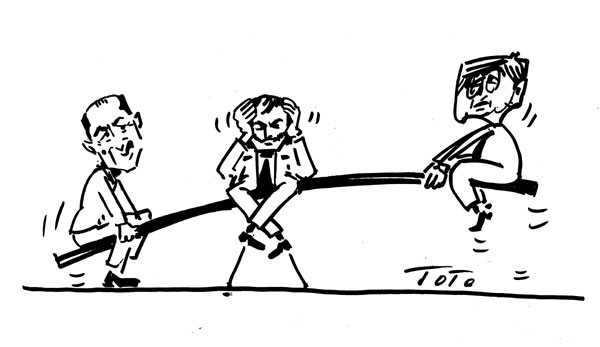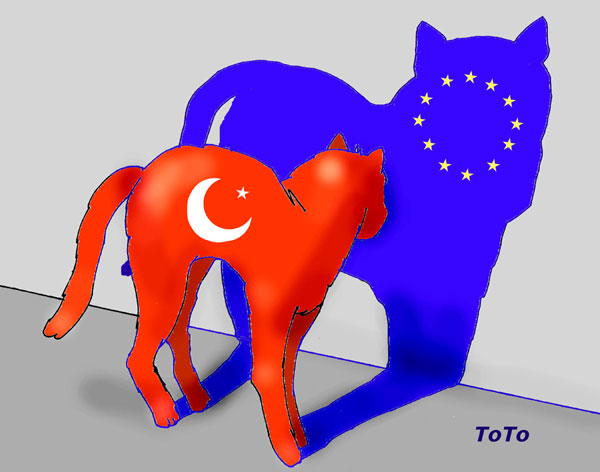SYMBOLISM AND REALISM IN THE KARABAKH ISSUE By Edmond Y. Azadian Since the ceasefire of 1994 between Azerbaijan and Karabakh the world Armenian community has been locked in a political roller coaster. Every summit meeting between the two sides, or any hopeful announcement by major powers, raises hopes for a settlement, yet the conflict continues on, with the same intensity. What is more alarming is the contradictory announcements that emanate from different camps. After every meeting, the Organization for Security and Cooperation in Europe (OSCE) Minsk Group co-chairs, representing the US, France and Russia, come up with assurances that "concrete discussions" had taken place, only to be refuted by Azerbaijan"s President Ilham Aliyev who says that he will not be satisfied with anything less than the return of Karabakh (Artsakh) to Azeri rule and not only that, but he is ready to conquer Armenia proper as well. Those bellicose statements are discounted as rhetoric for domestic consumption, but they do not contribute in any way to building confidence or inspiring any hope for a real, peaceful settlement of this intractable conflict. That is why people in Armenia meet all positive announcements regarding Artsakh with indifference or skepticism. There is a new announcement this week about hopeful steps taken at an OSCE-sponsored January 16 meeting in Paris with the participation of the foreign ministers of Armenia and Azerbaijan, Zohrab Mnatsakanyan and Elmar Mammadyarov, respectively. The positive tone of the group"s announcement is reinforced by a statement from Russian Foreign Minister Sergey Lavrov, who indicates that Armenia must respond in kind to the positive announcements coming from Baku. What the OSCE announcement says is that the two peoples of Armenia and Azerbaijan have to be prepared for the outbreak of peace. That statement, all along, has served as a code word for concessions. And concessions are only expected from the Armenian side. When Pashinyan was asked what compromises Armenia is ready to accept, his answer was: "We have to learn what Azerbaijan is offering." Armenia"s Foreign Minister Zohrab Mnatsakanyan has announced that there are red lines for Armenia: the security of the people in Karabakh and its final political status. Jean-Baptiste Lemoine, secretary general of the OSCE, made a cautious statement: "All the participants express their sincere gratitude to both foreign ministers for their intensive negotiations and their efforts towards creating a positive atmosphere." There is no word about the understandings reached at the meetings of St. Petersburg, Vienna and Geneva toward curbing border incidents in the interim. It is true that after a brief meeting in person between Prime Minister Nikol Pashinyan and President Aliyev in Astana, incidents on the Nakhichevan border with Armenia have subsided. An equivocal statement by President Aliyev may also be interpreted as a positive sign; he has blamed the previous regime in Armenia for its intransigence and has taken credit for himself that he has contributed to the downfall of that regime. All the parties which have a stake in the Karabakh conflict hide their self-interest under the guise of international law. Karabakh has never been an integral part of Azerbaijan"s territory. It was lopped off Armenia by Stalin and given to Azerbaijan. And based on that historic fact, Armenia"s contention is that Azerbaijan"s territorial integrity is not being violated. Therefore, to juxtapose the principal of territorial integrity with the Karabakh people"s right for self-determination becomes a legal nonstarter. But even Armenia"s friends, Russia and Iran, give credence to Azeri claims. The international community has always imagined a resolution for the conflict based on a scenario in which one or both parties suffer from political weakness. At this time, unprecedented rallies are taking place in Azerbaijan for the release of jailed Azeri bloggers and journalists. It seems that the movement is out of control and Aliyev"s administration is incapable of containing it. The Panama Papers and the Malta Laundromat have embarrassed the dynastic Aliyev regime internationally. On the other hand, the Kremlin had always treated Azerbaijan with kid gloves. But the controversy between Baku and Moscow has taken a serious turn over the recent bad treatment of Russian citizens of Armenian origin in Azerbaijan. Armenia, in its turn, has presented a similarly problematic situation to the powers-that-be. The Velvet Revolution, which ostensibly had the single goal of overthrowing the previous regime, also has impacted its international relations, particularly with its Moscow standoff and its extension of the Velvet Revolution to Karabakh, when Karabakh is at war and any instability may prove fatal. Despite that delicate situation, there were some demotions among the military brass. Fortunately calls to also replace the civilian government in Karabakh died down when the current president, Bako Sahakyan, announced that he will not seek reelection. Another sticky point was Pashinyan"s announcement that Karabakh should be a party to negotiations. Unfortunately, he did not stop there and he went on to state that Armenia is not authorized to negotiate on behalf of the Karabakh government. That statement is a double-edged sword; by forcing the parties to treat Karabakh as an independent entity at the negotiation table it may also mean that Karabakh is on its own before the international community, weakening its bargaining position. Following the recent elections in Armenia, the new government was challenged to sign a pact with the Karabakh administration about assisting each other in case of aggression against either party. That motion was tabled after a seasoned statesman, Andranik Kocharyan objected. Kocharyan has served as deputy minister of interior and deputy minister of defense in the past. He is extremely articulate and he can be considered as the most serious asset of the young government. Armenia faced another diplomatic row with another friend, namely Iran. Damage control was able to prevent the controversy from progressing further, after tarnishing the new administration"s foreign policy. Shock waves were sent through the news media when one of the young deputies in the parliament representing Pashinyan"s My Step Party, Hayk Konjoryan, had a slip of the tongue when in his speech he stated that Armenia is surrounded by authoritarian governments like Turkey, Azerbaijan and Iran. Of course, no one has any doubt that Iran is ruled by an authoritarian government, but that kind of a statement in the parliament about the only country in the region friendly to Armenia sounded awkward. Although the said deputy apologized and admitted it was a slip of the tongue, the media made a major issue of it, because the incident had coincided with another occurrence, which the media interpreted as a rebuke. Indeed, the chief of staff of the Iranian army, Maj. Gen. Mohammed Bagheri, was visiting Baku and at a meeting with the Azeri Minister of Defense Zakir Hasanov stated that Karabakh belongs to Azerbaijan and that Iran supports that country"s territorial integrity. The news item ricocheted from Baku to Tehran and Yerevan. Finally, the military attache at the Iranian embassy calmed down nerves and said the general"s statement was not a rebuke against the parliament speech. It was a reflection of Iran"s standard policy. Iran itself has faced a territorial claim from Azerbaijan and the latter"s former president, Abulfaz Elchibey, almost went to war to "liberate" Northern Azerbaijan from Iranian rule. In fact, Iran feels safer and more comfortable when Karabakh joins Armenia, which would extend the Iranian-Armenian border, at the expense of the Iranian-Azeri border. At this time, Armenia is facing more negotiations as a summit between Pashinyan and Aliyev is being planned. Armenia"s Foreign Ministry is tight lipped about the outcome of the Paris meeting and therefore Armenians are perfectly justified if they don"t raise their hopes at this time. In the Caucasus, preparing people for peace is an ominous symbol which cannot be taken as a realistic chance for a fair settlement. The Armenian Mirror Spectator, Boston, Jan. 26, 2019 | 






































